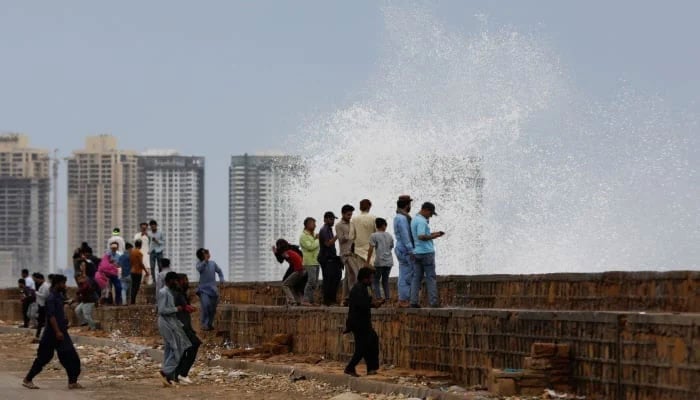'Chances of cyclone formation in Arabian Sea dim'
Chief meteorologist says no evolution of low pressure right now as cyclone is formed at its fifth stage
Chief Meteorologist Sardar Sarfaraz said on Wednesday that the chances of the formation of a cyclone in the Arabian Sea — which National Disaster Management Authority's (NDMA) Emergencies Operation Centre (NEOC) notified in an early alert yesterday — are dim.
The weatherman, speaking on Geo News' programme 'Geo Pakistan' about the possibility of a cyclone in the Arabian sea, said: "There is no evolution of low pressure right now as the cyclone is formed at its fifth stage."
The chief meteorologist also emphasised: "Considering the current weather conditions, I don’t think that it will become a cyclone and even if it does, then it is expected to move towards Oman by 70% to 80%."
Sarfaraz’s statement comes a day after NDMA body’s weather warning regarding the formation of a low pressure system in the Arabian sea, which it said may transform into a tropical storm.
The body said that this system may evolve into a full-fledged tropical cyclone, with the potential to affect the coastal areas of the country.
Following the NDMA body’s warning, Sarfaraz said that the cyclone has not formed yet.
“Low air pressure may develop in the southeast of the Arabian Sea by October 9 or 10,” he said.
As per the weatherman, southeastern part of the Arabian Sea is close to the southern coast of India.
“The lower air pressure can intensify if favourable weather conditions are met,” he said. However, Sarfaraz added that it is too early to say if the cyclone will hit Pakistan's coastline.
According to Sarfaraz, cyclones are formed in the post-monsoon seasons.
“As compared to the cyclones in the months of May and June, the cyclones in these months have their track mostly move towards the westward,” he said.
Sarfaraz stated this in light of the change in weather conditions usually from four to six days.
He also added that the temperature in Karachi is likely to remain the same till next week.
-
Security forces gun down 30 terrorists in multiple IBOs in KP: ISPR
-
MQM-P calls for new province in Sindh
-
US report validates Pakistan military edge over India: PM
-
Banned TTP poses serious threat to Pakistan security: UNSC panel
-
CM Afridi clarifies remarks on by-poll after ECP requests army deployment
-
Dubai sees 3.2m Pakistani passengers in 2025 as airport sets new milestone
-
Security forces kill 23 Indian proxy terrorists in KP's Kurram
-
Pakistan to construct island to boost oil exploration: report












